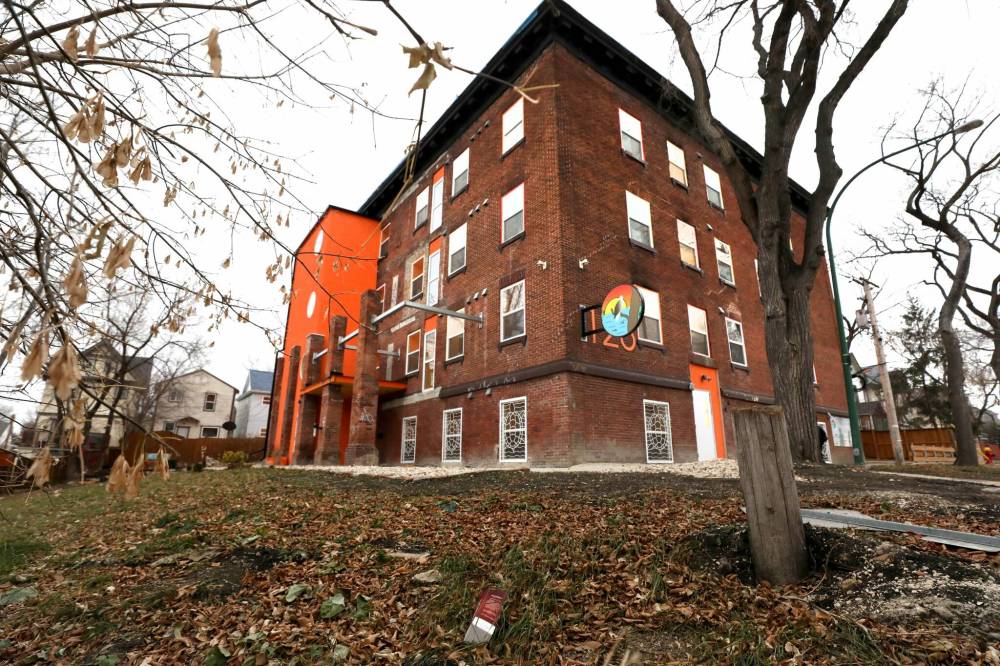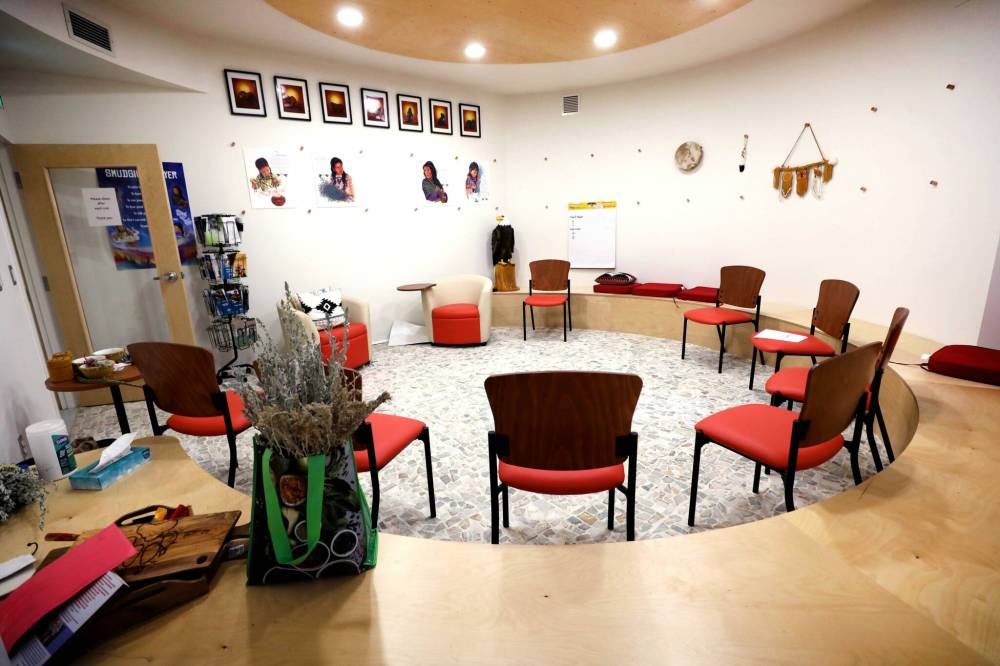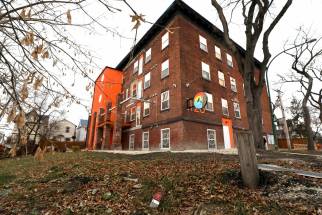From ashes to affordable housing Refurbished North End complex offers key resources for young Indigenous tenants
Read this article for free:
or
Already have an account? Log in here »
To continue reading, please subscribe:
Monthly Digital Subscription
$0 for the first 4 weeks*
- Enjoy unlimited reading on winnipegfreepress.com
- Read the E-Edition, our digital replica newspaper
- Access News Break, our award-winning app
- Play interactive puzzles
*No charge for 4 weeks then price increases to the regular rate of $19.00 plus GST every four weeks. Offer available to new and qualified returning subscribers only. Cancel any time.
Monthly Digital Subscription
$4.75/week*
- Enjoy unlimited reading on winnipegfreepress.com
- Read the E-Edition, our digital replica newspaper
- Access News Break, our award-winning app
- Play interactive puzzles
*Billed as $19 plus GST every four weeks. Cancel any time.
To continue reading, please subscribe:
Add Free Press access to your Brandon Sun subscription for only an additional
$1 for the first 4 weeks*
*Your next subscription payment will increase by $1.00 and you will be charged $16.99 plus GST for four weeks. After four weeks, your payment will increase to $23.99 plus GST every four weeks.
Read unlimited articles for free today:
or
Already have an account? Log in here »
Hey there, time traveller!
This article was published 14/11/2022 (1119 days ago), so information in it may no longer be current.
Where once was rubble from a fire that had torched much of the building seven years ago, is now a secure foundation, where a bed comforts a child each night.
Where once were shards of glass, lying outside a boarded-up window, is now a common area for tenants to gather as a community. And in what was once a neglected entrance now sits a young Indigenous resident at a front desk, with a glimmer of hope in their eyes owing to the stable living situation they so desperately coveted and now managed to find.
The apartment block at 126 Alfred Ave. in Winnipeg’s North End is a livable space once again and, after more than a year of renovations, is home to 24 young Indigenous tenants. The building, formerly known as the Noble Court Apartments, was purchased in 2021 by Shawenim Abinoojii Inc., an Indigenous-led, not-for-profit service organization, and refurbished into an affordable housing option.
RUTH BONNEVILLE / WINNIPEG FREE PRESS The apartment block at 126 Alfred Ave. in Winnipeg’s North Point Douglas neighbourhood has been transformed into a place that about two dozen Indigenous youth and young adults call home.
The building opened in late May and was at maximum capacity within two weeks, its waiting list still growing months later.
“I don’t even know where to start,” said Brandy Kowal, director of youth transition services for Shawenim Abinoojii.
“The feedback, so far, has been really positive from the youth and any guests that we’ve had come through the building. There’s just a really positive energy in this space. And I think that comes from all the pre-work that went into doing this project.”
Tenants range from 17-24 years old, some of whom have children of their own, but Kowal said the organization is flexible on who they accept in the apartment block, so long as the applicant is willing to accept support from the organization. Most residents are expected to spend about two years in the transitional housing unit, allowing them time to develop necessary skills to join the workforce and receive support for any issues or trauma that need nurturing before they move on to their own homes.
“The feedback, so far, has been really positive from the youth and any guests that we’ve had come through the building. There’s just a really positive energy in this space.”–Brandy Kowal
Monthly rent costs are based on the tenant’s income. While some are in care, others have moved from Child and Family Services and are receiving Employment and Income Assistance or working. Residents sign an agreement that outlines how they are expected to care for their unit and work toward their personal goals under the support of Shawenim Abinoojii.
The project appears to be a smashing success in its early goings and, according to Kowal, has paid dividends for the young residents, as a large, supportive community has formed among the tenants.
“Just thinking about it makes me a little bit teary… I distinctly remember walking into this building when it was a hole in the ground, and it looked like a cave,” Kowal said. “And now, seeing youth set up their apartments and bringing in their furniture — and some them have their babies here, so seeing young families being supported — it’s extremely emotional. It’s very humbling because so many people worked together to make this space what it is, and now we get to walk alongside the youth while they’re making their transitions into adulthood.
photos by RUTH BONNEVILLE / WINNIPEG FREE PRESS Victoria Fisher, right, executive director of Shawenim Abinoojii, Brandy Kowal, left, program manager, and a group of residents and support staff in the open kitchen space in the home.
“That’s a very powerful experience and it makes me feel all kinds of emotions… it’s joy and excitement and it makes me tear up.”
One of the building’s key features is its basement, which serves as a resource centre for tenants, where services such as reunification programs for parents are offered and traditional ceremonies can be performed. As Victoria Fisher describes, it’s a safe, positive and sacred space that has been realized by the vision of those at Shawenim Abinoojii.
“We have other staff, as well, to comment on the spirit that you feel when you walk into this building,” said Fisher, executive director of the Indigenous-led non-profit. “The relationships that are formed between tenants, seeing people in the common kitchen area, talking and laughing and just living their lives in a good, healthy way.”
“Within a few weeks of opening there was a wait list, and there continues to be a wait list. We recognize the need to have additional resources such as this space.”–Victoria Fisher
Fisher confirmed that Shawenim Abinoojii is looking into similar opportunities to help Indigenous youth across the city, which could include another affordable housing project.
“I think going through this expense has demonstrated to us the capacity of Indigenous-led non-profits in developing resources that respond to the needs of the people that we serve,” she said.
“Within a few weeks of opening there was a wait list, and there continues to be a wait list. We recognize the need to have additional resources such as this space. So we look forward to working with stakeholders and developing resources that continue to respond to those needs.”
Kowal said some of the youth Shawenim Abinoojii worked with prior to the building were, as she described, “hidden homeless,” meaning they were couch surfing around the city. She explained the apartment block has offered some much-needed stability in the lives of many tenants, who are also in the “emerging adulthood” phase of their cognitive development.
RUTH BONNEVILLE / WINNIPEG FREE PRESS Real estate Shawenim Abinoojii is a newly renovated apartment block at 126 Alfred Ave. in Winnipeg's North Point Douglas neighbourhood.
“It’s everything, if we think about youth who aren’t dealing with the same trauma history, or who haven’t been involved with Child and Family Services. A lot of youth across Canada have a safety net — they’re staying home with their parents longer, they leave and then they can come back afterwards if something goes wrong. They just have a longer time to be supported,” she said.
There are more than 1,100 people experiencing homelessness in Winnipeg, as of 2021, according to the Canadian Observatory on Homelessness. Of those, 22 per cent are 24 years old and younger and two-thirds are Indigenous.
“A huge part of developing and growing is having that stability and that safety,” Kowal said. “So 21 (years old) isn’t old enough — we need to be able to support youth for longer and provide that safety and stability, because that’s what’s developmentally appropriate and that’s what’s right.”
jfreysam@freepress.mb.ca
Twitter: @jfreysam

Joshua Frey-Sam happily welcomes a spirited sports debate any day of the week.
Our newsroom depends on a growing audience of readers to power our journalism. If you are not a paid reader, please consider becoming a subscriber.
Our newsroom depends on its audience of readers to power our journalism. Thank you for your support.







